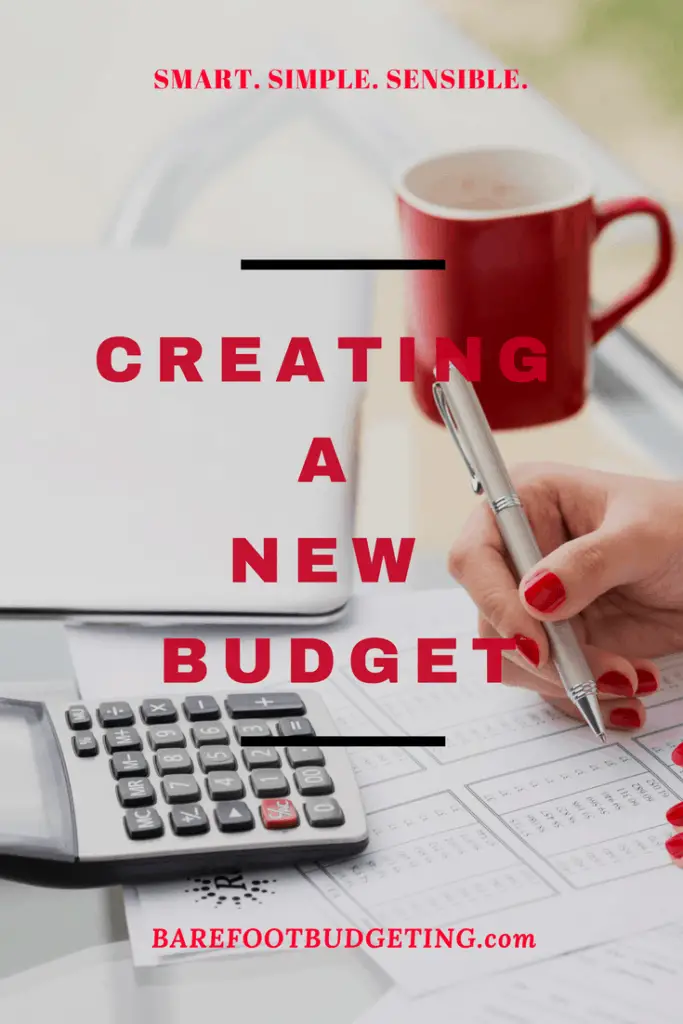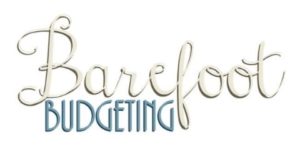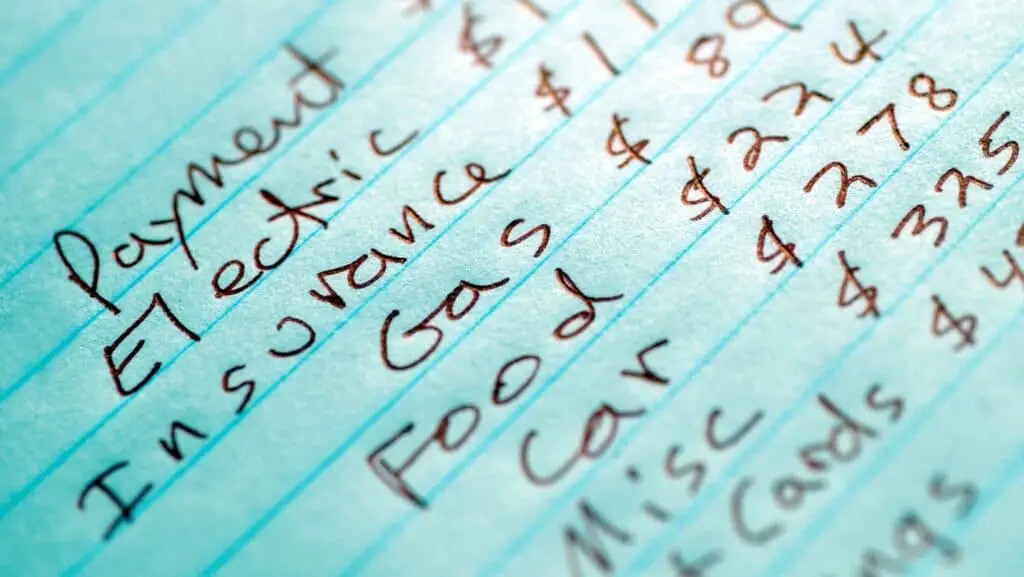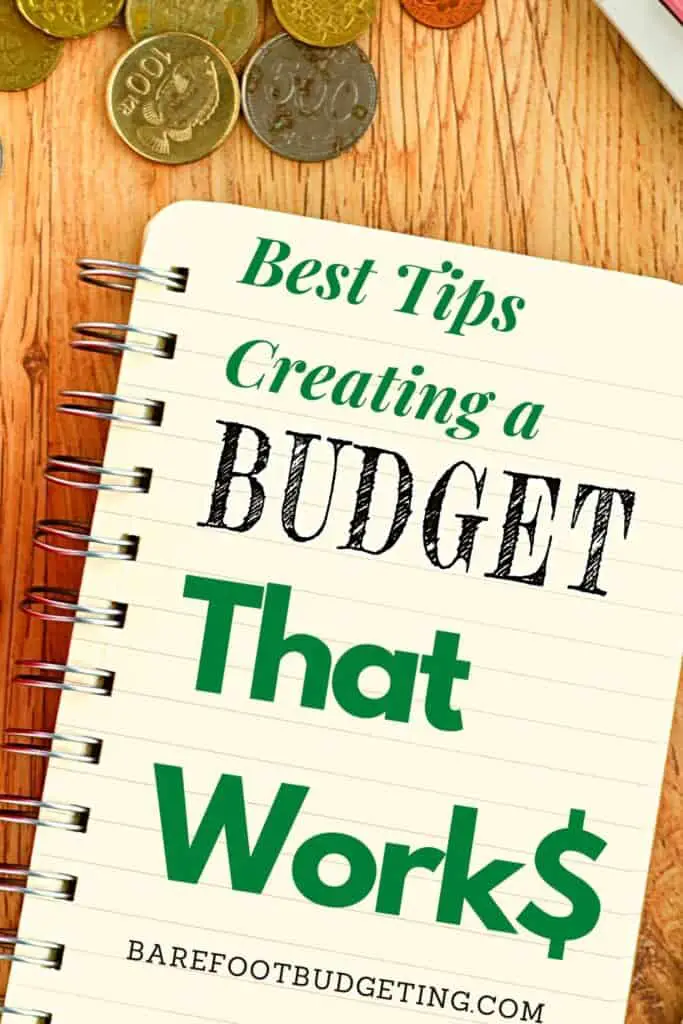*This post may contain affiliate links. As an Amazon Associate we earn from qualifying purchases.
Creating a new budget ? If you are going into the new year with big plans to change your financial life, you probably know that creating a budget is a great way to get started on making those changes. A budget can do many things for you, including:
- Get you caught up on bills.
- Give you an view of where your money is going.
- Allow you to build your savings.
- Keeps your financial life organized.
- Set financial goals like buying a home, a car, etc..
BONUS: Less Anxiety and Uncertainty in your life.

How Many Americans Actually Create A Budget?
- Approximately half of Americans budget every 5 years.
- 32% of Americans have done or re-done their budget in the past 1-5 years.
- Nearly 24% of Americans have re-visited or newly created a budget during the COVID Pandemic.
- 38% do almost no budgeting at all!
source: interest.com
In The Last 30 Days How Much Did You Spend and on What?
- 65% of Americans have NO IDEA how much money they spent or where it’s going.
- 23% of Gen Z can tell you where their money is going.
- 46% of Baby Boomers Know what they spent/ where it’s going.
source: Mint
Let’s change that today. Sound like a good plan?
Budgeting Successfully; Get Started Making Your Budget
Maybe you’ve tried a budget before. In fact, maybe you’ve been budgeting all of your adult life but your current budget just isn’t working for you. You’re not alone. I am forever tweaking my budget and changing things according to my new goals.
Creating your first budget can be a daunting task. Finding that your budget doesn’t work for you can even create stress. If you truly want to budget successfully, you need to find a budget that works for you. YOU. DO YOU !
What you may not have been told before is that there are many different ways to budget. There are different systems out there for different people and the real trick is in finding what works for your personal needs. Sometimes this means taking an existing system and tweaking it a bit so that it works for better for your style.
As we talk about how to get started budgeting successfully, we’re going to talk about the basics. We’re also going to offer some resources to help you. After that, you can take your own twist on it.
Maybe you’ll tweak some things here or there, or only use the things that directly benefit you. That’s perfectly fine. Again, the whole point of a budget is that you create something that works for you that you will use regularly. With that in mind, let’s get into the basics of setting up your budget and making it successfully part of your life.
Let’s Get Down n Dirty ~ 10 Tips for Creating a Budget
Do any of the above benefits sound good to you, then you may want to get started creating your budget. If you need a little help, here are 10 tips for creating a budget for your goals that will help you get your finances in order.
1. Determine Your Income.
Are you an hourly employee or salary? Does your spouse work? Be sure that you list all of your income to be sure that you have a good idea of where your monthly income comes from.
You want to look at your actual take-home pay and not your gross income since there will be taxes, 401K and other things that may come out. If you have a side hustle that brings in money you can estimate/average based on history of previous months. Just use caution to consider if any of this additional income is seasonal.
So many think when you’re creating a budget it only means putting in what bills you have to pay. First thing to write down in your budget is what you have for income.
2. Write Out Your Debts.
It’s a good idea to get started on this process by knowing what all of your debts are. This is for two reasons. First, you need to be sure and pay your bills each and every month and you also need to know where to send extra payments to get this debt down.
When looking at the money going out, there are all of the obvious expenses
- Rent/ mortgage
- Electric/ gas/ other utilities
- Insurance (car, health, home, life, etc.)
- Loans/student loans/ credit cards
- Transportation
- Food/ household spending
These are not necessities but they don’t necessarily need to be cut from the budget, so long as you account for them properly.
- How often do you eat out
- Do you pay for extra cable packages
- Do you like going to the movies
- Do you pay to play golf or for clubs
- Do your children have activities
Great Read: Over 50 Ways to Budget Accordingly for Your Monthly Spending
3. Figure Out Where Your Money Is Going.
Outside of determining your income and debt. Your first step in creating a budget is to track and calculate your expenses. Do this for for 1 month.
Keep a receipt for everything you spend money on. Even if it is just a couple dollars, it matters. Put an envelope in your car if you shop retail or hit the drive thru often. Drop the receipt in envelope every time you go out. Bring them in at the end of the day or week.
If you use your debit card frequently, check your statements to track these down to the penny.
It’s also very important to accurately track your spending. Many people track their income versus their expenses but still end up short at the end of the month and they don’t know why. This happens when you’re not tracking your spending. All of those little things like eating out or grabbing a specialty coffee on your way to work add up. Most people new to budgeting will be very conservative in their spending estimates. This means they underestimate how much they really spend on things. A good way to get an accurate number is to keep all of you receipts for one week and also for one month. Everything, no matter how big or small, should be kept. Most people discover from this that they spend more than they realized. There are different ways to handle this in your budget such as the envelope spending plan or leaving credit and debit cards at home so you are not tempted to spend more than you should. Many people use a cash-only plan for their extra spending and this works out well.
4. Set Goals.
What is your goal? Do you want to add to your savings, or save up to a specific amount? Setting these goals will help you to stay focused on following your newly created budget.
- Save for or increase Emergency Fund
- Pay Off Credit Cards
- Pay Off Car
- Save for House
- Save for Remodel
5. Plan For Budget / Expense Cuts.
Now that you know where your money is going, you will be able to figure out where your unnecessary spending is and plan to cut that out. Be realistic in this process though. It’s hard to cut out every expense, especially when you are used to not having guidelines.
Let’s say for example, that you typically spend $50 per month on lattes in the morning, start by cutting that down to $25. Splurging is fine as long as it is in moderation.
Another Great Read: Easiest Ways To Save; Smart, Simple, and Sensible Savings
6. Save First Is Priority When Creating Your Budget.
Rather than seeing how much is left at the end of the month to save from, be sure and follow the save first mentality. Put your savings away before you spend. Pay Yourself First!
7. Decide Your Spending Preference.
Do you have a hard time letting go of cash? If you said yes, then you may want to try the cash envelope system for spending. You will find that you spend less if it is all in cash.
If you find it easy to spend cash, but you hesitate to swipe your card, then you should be on a card spending plan. Use your strengths and weaknesses to help you not work against you.
8. Pen To Paper or Digital Record of Your Budget
Putting pen to paper and writing out our expenses and income is a huge driving force for many people when it comes to their budget. For many it really personalizes it and makes it real. I like old fashioned ledger columns feel but in a spreadsheet, many of you are turning to bullet journals to track your money. Budget trackers are available for purchase, print and in digital formats as apps.
The key is to have it documented somewhere you will be able to look at easily, regularly. Your budget is there to help you, don’t stash it away and ignore it like it’s an ‘ugly sweater’.
More Great Reading: Stop Living Paycheck to Paycheck with No Budget
9. Using Tools Will Help Creating A Budget Easier
Look for a great budgeting app to download onto your phone or computer (your spouse too). Most of these apps are real time, so they make it easy to see where you stand on your budget at any given time. Think of it like your personal bookkeeper.
There are also more tools than ever before to help you make budgeting even easier. For example, there are printables for things like weekly budgets, an annual bill checklist, your checkbook register and more. Using printables takes a lot of the work out of the equation for you. You will already have everything you need and all you have to do is fill in the blanks. This will make it so much easier for you.
You can organize your budget digitally if you’d like. There are even software programs that make it easier, or you might decide to use printables, paper and a notebook to track everything. Again, the idea is that you do what works best for you. If a fancy online budget tool isn’t something you will stick to, then go old-school with a pen and notebook.
10. Re-Evaluate. Review. Re-Do.
Budgeting successfully is an ongoing process. You’ll want to re-visit your budget frequenty and make changes as your life’s circumstances change. Things such as a raise, a pregnancy, a move, new goals. These all have an impact on your budget and reviewing the budget often will help you stay ahead of it all.
I know that the idea of a budget seems too rigid to some, but as long as you stay the course and stay disciplined or rather, determined about following it, you will find much more freedom that you imagined!
The #1 reaon people fail at budgeting is by giving up. They start off strong but eventually just stop doing it. They don’t track their spending, they don’t use their trackers, and they forget to keep an eye on their savings and where their money is going.
It’s easy to do when life gets so busy. This is why a good system for you is one that you are most likely to stick with. If you’re not going to use it regularly, it’s not going to work for you.

Tip:
Find a Budget Buddy to check in with. You can talk with them about ways you saved or ways your struggling with. You’ll find your buddy or buddies will strive to a better budget as well as have some great tips to help you out. I have many budget buddies, they may not know it, but they’re incredibly valuable in my life.
Chat with co-workers about meal ideas to help me save yet not get bored with meals. Gab it up with friends about struggles to find an affordable yet comfy pair of shoes I LOVE (i’m intensely picky). Toss around ideas with family about how to save for vacations or holiday plans and see if there are ways we can share expenses. Lastly, and this was the hardest for me. I talk with my husband about the ‘big’ picture. The retirement goals.
Getting it done! : Read about the well known No Spend Challenge here!
The Back Story
My Budgeting story is not unlike a lot of others. I fell on hard times pretty early on in my life. You know, the thing about being young and struggling is it seems to take longer to learn a better way. When you’re young you don’t think those things. Looking back, I can say I’m living proof.
I was a single teenage mom and doing it alone for a good many years. I paid my bills (and umm, sometimes had to ask for help doing that too!) and I got by. That was it! Getting by.
Life is a whole bunch more than getting by. You’ll want to take vacations, help your kids participate in sports, after school activities, and do things with their friends. You get older and you find you’re making ‘Getting by’ a way of life and don’t even realize you’re not getting by, you’re getting nowhere.
Money Mindset is such a huge part of our finances. You need to know you can do this. Believe in yourself. Believe in your goals!
Budgeting allows you to take a realistic and honest look at your finances. You get to weigh out needs and wants. You get to plan, make goals and slowly you’re reaching milestones then mountains.
I use Quicken on my desktop, which I adore! And if you know me, my phone is constantly being misplaced and abused so I feel much safer having this here at home. I also find budgeting for me at a desk in a quiet place where I can concentrate works better than on my phone, where I easily get distracted.
Find your style, your budget groove and you guessed it….. YOU. DO. YOU.

Final Words
Thanks so much for reading through and I know it’s not always easy but we’re in this together. I hope you found some useful information that seems less overwhelming now.
If you’re looking for ways to save, well.. you’ve come to the right place. I’m pretty much trying to find something for everyone here, so look around and I dare you to only find ONE way to save that you weren’t trying already!
Do you feel like you’re saving in every way you can? Looking for smart sensible simple ways to earn? I’ve got you covered my friend!
We’re in this together and your success is as important to me as it is to you. Keep the path and remember, you are worth it!





